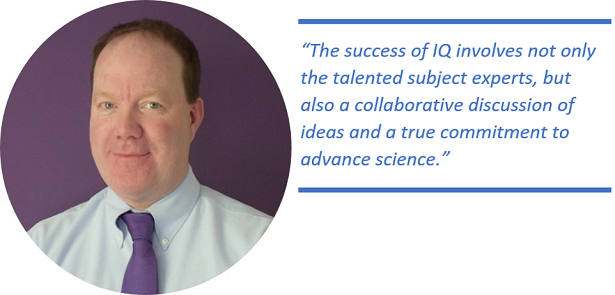MICHAEL GARVIN, PharmD
IQ Board of Directors Member (2014-Present)
Senior Director Regulatory Policy, AstraZeneca
PharmD, University of Maryland
WHEN DID YOU FIRST GET INVOLVED WITH THE IQ CONSORTIUM?
I became involved prior to the official launch of the IQ Consortium. A new forum needed to be established to maintain direct interactions with various FDA senior leaders and teams. In 2008, I was with PhRMA when Lew Kinter shared broad stroke concepts of a bold plan discussed by several industry experts. This was a brand new initiative that had to be developed and put together, nothing was guaranteed. These individuals had to convince their companies to allocate additional funding for this new venture, advocate for the value added of this effort, as well as be the workforce. Having known and worked with many of the now founding IQ members previously on significant projects, I was a huge supporter and cheerleader of this endeavor.
WHAT FACTORS HELPED DRIVE THE GROWTH AND SUCCESS OF IQ?
From my view, common factors that helped to establish IQ were the drive, determination and desire of those involved in the time leading up to the formation. There was a commitment to ensure that robust, scientific discussion, collaboration and industry perspective continued to occur. There were certain logistical events that also had to fall into place for this initiative to work. The fortunate involvement of members of the Faegre Drinker Biddle & Reath (Faegre Drinker) consortia management team provided the right amount of light touch with solid structure, support and guidance to get this process off on a positive step. I believe the founders’ spirit to drive the scientific discussion endures among the current experts. The continued partnership with the Faegre Drinker Secretariat allows the flexibility for the Consortium to continue to evolve in addressing the increasingly varied topics. The success of IQ involves not only the talented subject experts but also a collaborative discussion of ideas and a true commitment to advance science.
March 2021
